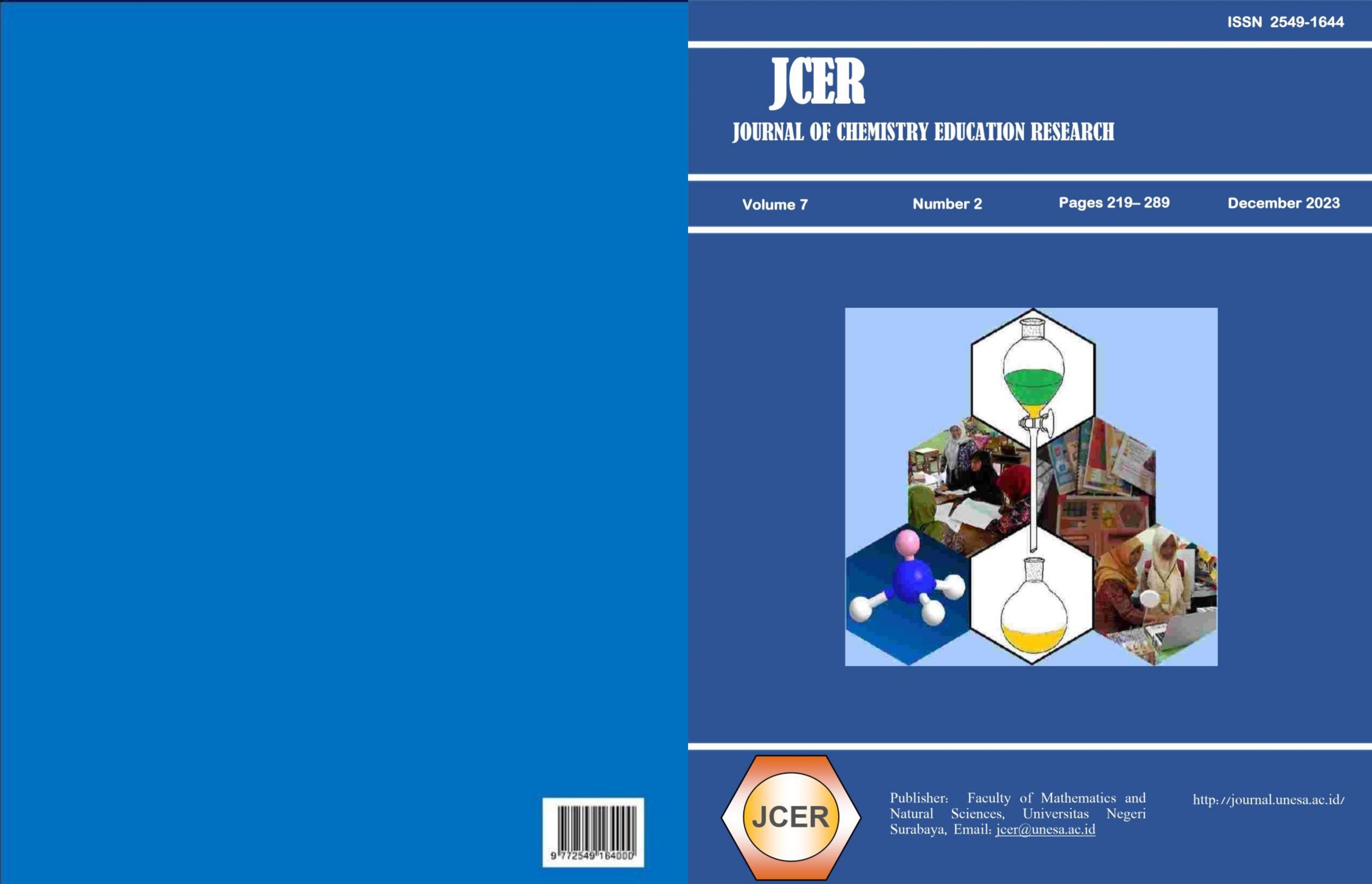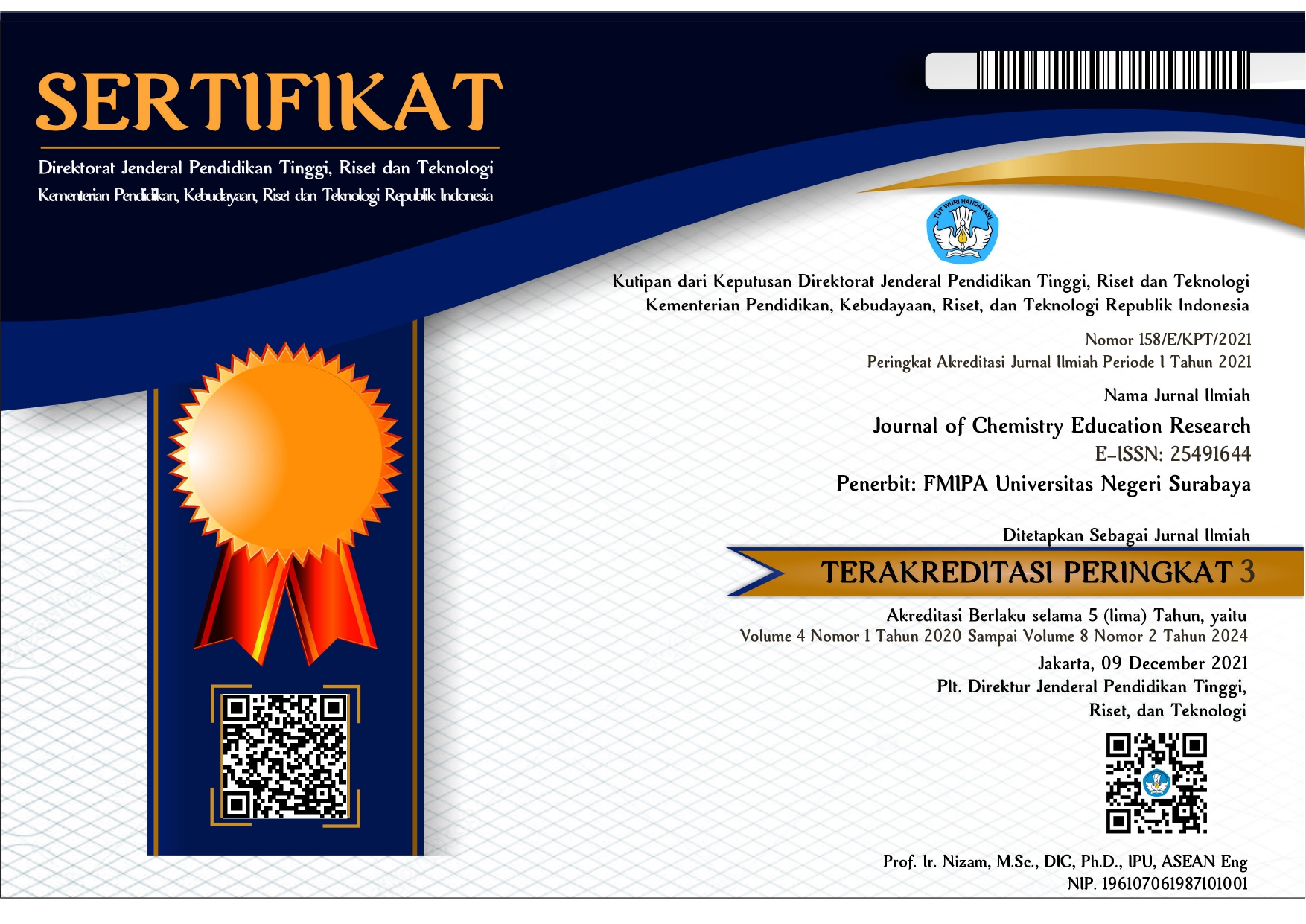Implementation of Hydrocarbon Adventures Game as An Online Learning Media During Covid-19 Pandemic
DOI:
https://doi.org/10.26740/jcer.v7n2.p219-226Keywords:
Learning media, Hydrocarbon Adventures Game, Covid-19 PandemicAbstract
The purpose of this study was to determine the application of the game Hydrocarbon Adventures as an online learning medium for hydrocarbon compounds in the covid-19 pandemic. The design of this study used the one-group-pretest-posttest experimental method. The target of this research is online learning using Hydrocarbon Adventures media games conducted by 27 grade XI students of Senior High School 1 Sampang. The students will be given a pretest before using the game and post test after using it. After that, students will be given questionnaire for the learning using online learning media. The results showed that student learning outcomes after using the learning media Hydrocarbon Adventures game had increased with classical completeness for values reaching 92.59%, and an increase in student learning outcomes at an average pretest value of 44.19 into an average post test score amounting to 83.41. Student responses about game media were obtained 79.2%. Based on these results, it was concluded that the Hydrocarbon Adventures learning media on the material of hydrocarbon compounds through online learning during the covid-19 pandemic can improve student learning outcomes.
The purpose of this study was to determine the application of the game Hydrocarbon Adventures as an online learning medium for hydrocarbon compounds in the covid-19 pandemic. The design of this study used the one-group-pretest-posttest experimental method. The target of this research is online learning using Hydrocarbon Adventures media games conducted by 27 grade XI students of Senior High School1 Sampang. The students will be given a pretest before using the game and post test after using it. After that, students will be given questionnaire for the learning using online learning media. The results showed that student learning outcomes after using the learning media Hydrocarbon Adventures game had increased with classical completeness for values reaching 92.59%, and an increase in student learning outcomes at an average pretest value of 44.19 into an average post test score amounting to 83.41. Student responses about game media were obtained 79.2%. Based on these results, it was concluded that the Hydrocarbon Adventures learning media on the material of hydrocarbon compounds through online learning during the covid-19 pandemic can improve student learning outcomes.
References
[1] Mahase, E. (2020). Coronavirus: covid-19 has killed more people than SARS and MERS combined, despite lower case fatality rate . The BMJ.
[2] Hendra, F. (2020, Maret 12). WHO Umumkan Corona COVID-19 Sebagai Pandemi. Dipetik April 15, 2020, dari tirto.id: https://tirto.id/eEvE
[3] Mustinda, L. (2020, April 07). Perbedaan Social Distancing, Physical Distancing hingga PSBB. Dipetik April 15, 2020, dari Detik News: https://news.detik.com/berita/d-4968496/
[4] Kemendikbud. (2020, Maret 15). Cegah Sebaran Covid-19 di Satuan Pendidikan, Kemendikbud Gandeng Swasta Siapkan Solusi Belajar Daring (Siaran Pers BKH Kemendikbud Nomor: 054/SIPRES/A6/ III/2020). Dipetik April 15, 2020, dari Mendikbud.go.id: https://www.kemendikbud.go.id
[5] Darmalaksana, W., Hambali, R., Masrur, A., & Muhlas. (2020). Analisis Pembelajaran Online Masa WFH Pandemic Covid-19 sebagai Tantangan Pemimpin Digital Abad 21. . Karya Tulis Ilmiah (KTI) , 1-12.
[6] Sanjaya, R. (2020). 21 Refleksi Pembelajaran Daring di Masa Darurat. Universitas Katolik Soegijapranata: SCU Knowledge Media.
[7] Yanti, M. T., Kuntarto, E., & Kurniawan, A. R. (2020). Pemanfaatan Portal Rumah Belajar Kemendikbud Sebagai Model Pembelajaran Daring di Sekolah Dasar. Jurnal Pendidikan Dasar, 5(01), 61-68.
[8] Suryani, Y. E. 2010. Kesulitan belajar. Magistra No. 73 Th XXII. ISSN 0215 9511.
[9] Pengondian, R. A., Santosa, P. I., & Nugroho, E. (2019). Faktor-faktor yang Mempengaruhi Kesuksesan Pembelajaran Daring dalam Revolusi Industri 4.0. Seminar Nasional Teknologi Komputer & Sains (SAINTEKS), 56-60.
[10] Ristiyani, E., & Bahriah, E. S. (2016). Analisis Kesulitan Belajar Kimia Peserta didik di SMAN X Kota Tanggerang Selatan. Jurnal Penelitian dan Pembelajaran IPA, 2(1), 18-29.
[11] Effendi, A. (2012). Pengembangan dan Penggunaan Instrumen Diagnostik Two-Tier untuk Mengidentifikasi Miskonsepsi Peserta didik tentang Asam basa di SMA Negeri 7 Malang. Universitas Negeri Malang: SKRIPSI Jurusan Kimia, FMIPA.
[12] Fauzia, E., Lutfi, A., & Yonata, B. (2012). The Development of SABC (Solve Acid Base Case) Game Oriented Android as Intructional Media Acid Base for Eleventh Grade Senior High School. UNESA Journal of Chemical Education, 339-344.
[13] Prasetyo, Y. D., & Irwanto. (2015). Utilization effectiveness of chemistry instructional media to improve self regulated learning and learning outcomes of high school students. Proceeding The First International Islamic University of Indonesia (hal. 111-115). Daerah Istimewa Yogyakarta: Islamic University Indonesia.
[14] Amilia, P., & Agustini, R. (2016). Pengembangan Media Permainan Ular Tangga Pada Materi Senyawa Hidrokarbon Kelas XI SMA Untuk Meningkatkan Pemahaman Konsep Peserta didik. Unesa Journal of Chemical Education, 5(2), 336-344.
[15] Anis, R., & Lutfi, A. (2019). Mobile Game Chemistry Tricky Test sebagai Media Pembelajaran Kimia SMA/MA pada Pembelajaran Kimia. Jurusan Kimia FMIPA Universitas Negeri Surabaya. Prosiding Seminar Nasional Kimia.
[16] Freitas, S. (2013). Learning in Immersive Worlds: a review of game-based learning. London: CURVE.
[17] Innafa, R. N., & Lutfi, A. (2019). Permainan House Chemistry sebagai media pembelajaran pada materi hidrokarbon kelas XI SMA. Unesa Journal of Chemical Education, 8(2), 43-49.
[18] Dwi, I., & Lutfi, A. (2012). Media Permainan Castle Of Element Berbasis Komputer Sebagai Media Pembelajaran Pada Materi Pokok Unsur, Senyawa, dan Campuran. Unesa Journal of Chemical Education, 1(2), 84-91.
[19] Sudjana, N., & Rivai, A. (2011). Media Pengajaran. Bandung: Sinar Baru Algensindo.
[20] Sugiyono. (2012). Metode Penelitian Kuantitatif, Kualitatif, dan R & D. Bandung: Alfabeta.
[21] Riduwan. (2015). Skala Pengukuran Variabel-variabel Penelitian.. Bandung: Alfabeta.
[22] Rohmawati, M. (2012). Penggunaan Education Game Untuk Meningkatkan Hasil Belajar IPA Biologi Konsep Klasifikasi Makhluk Hidup. Jurnal Pendidikan IPA Indonesia, 1(1), 75-81.
[23] Andiastutik, E., & Lutfi, A. (2017). Pengembangan Permainan Diamons Chemistry Adventure sebagai Media Pembelajaran Pada Materi Pokok Hidrokarbon Kelas XI SMA. Unesa Journal of Chemical Education, 6(2), 212-218.
[24] Lutfi, A., Suyono, & Nur, M. (2014). Penilaian Permainan Bersarana Komputer Sebagai Media Pembelajaran Ilmu Pengetahuan Alam. Prosiding Seminar Nasional Kimia (hal. ISBN 978-602-0951-003). Jurusan Kimia FMIPA: Universitas Negeri Surabaya.
[25] Pekdag, B. (2010). Alternative Methods in Learning Chemistry : Learning with Animation, Simulation, Video and Mutimedia. Jurnal Of Turkish Science Education, 7(2), 80-118.
[26] Sadiman, A. S. (2014). Media Pendidikan Pengertian, Pengembangan, dan Pemanfaatannya. Depok: PT RajaGrafindo Persada.
[27] Chittleborough, G.D. (2004). The Role of Teaching Models and Chemical Representations in Developing Mental Models of Chemical Phenomena. Thesis. Science and Mathematics Education Centre.
Downloads
Published
Issue
Section
License
Copyright (c) 2023 JCER (Journal of Chemistry Education Research)

This work is licensed under a Creative Commons Attribution-NonCommercial 4.0 International License.
 Abstract views: 240
,
Abstract views: 240
, PDF Downloads: 194
PDF Downloads: 194



